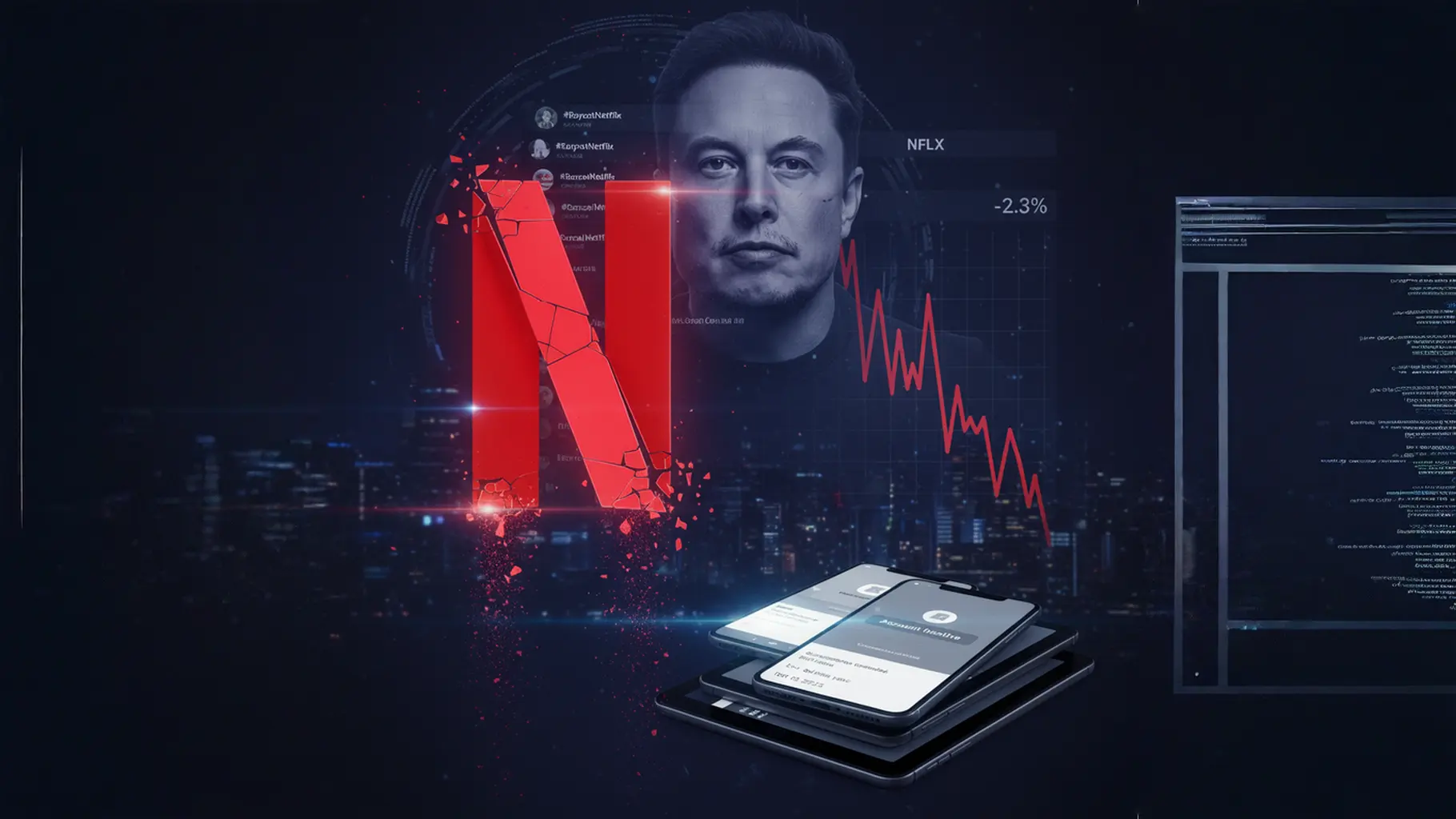Mumbai, October 03, 2025 – Once hailed as the undisputed king of streaming, Netflix is facing a wave of subscription cancellations. What was once a platform synonymous with binge-worthy entertainment has now found itself at the center of cultural and political debates. Recently, a high-profile call to boycott Netflix by billionaire entrepreneur Elon Musk has amplified the churn, sparking questions about how much influence celebrities and cultural controversies can have on consumer behavior.
The growing trend of users canceling their Netflix subscriptions is no longer just internet noise—it is a real market signal with implications for both investors and the future of content creation.
Musk vs. Netflix: A Clash Beyond Entertainment
The controversy erupted after Elon and several other public figures announced that they were canceling their Netflix subscriptions. The trigger? An animated show that Musk and others found problematic, sparking a debate about the boundaries of creative freedom and cultural influence.
Musk’s boycott wasn’t an isolated act of personal choice—it was a statement that gained traction quickly on social media. When a personality with Musk’s global following makes a public stand, the ripple effects are inevitable. His call to boycott Netflix turned into a trending narrative that pushed thousands to reconsider their subscriptions.
The Immediate Market Impact
The financial markets reacted swiftly to the backlash. Following the boycott call, Netflix’s stock price dropped by nearly 2.3% in a single day. While not all of this decline can be attributed solely to Musk’s statement, the timing and the negative buzz clearly influenced investor sentiment.
For a publicly traded company like Netflix, perception is almost as powerful as reality. Even a temporary dent in confidence can cause stockholders to panic, and in today’s digital age, narratives spread faster than ever. Musk’s comments highlighted how vulnerable streaming platforms have become to external voices and cultural flashpoints.
The Churn Is Real: Subscription Cancellations Surge
Unlike many online trends that fizzle out, this backlash has been accompanied by hard evidence. Screenshots of cancellation confirmation emails from Netflix have been circulating widely, showing that people are not just talking about canceling—they are actually doing it.
From long-term users to recent subscribers, a diverse set of customers have joined the exodus. For the company, this raises a deeper concern: the line between casual viewer dissatisfaction and actual subscription churn is becoming increasingly thin.
This trend underlines the fact that subscription-based platforms cannot afford to ignore cultural sentiment. Once users cancel, winning them back requires significant effort, often involving costly incentives or changes in content strategy.
The Cost of Creative Freedom
One of the most striking implications of this controversy is the changing perception of creative freedom. Traditionally, streaming platforms prided themselves on offering diverse, bold, and boundary-pushing content. The company, in particular, built its reputation by funding original shows that mainstream networks often avoided.
However, the recent backlash has reframed creative decisions as potential market liabilities. Investors, executives, and even content creators are beginning to consider what is being called the “Influence Risk Score”—the idea that every show carries with it a potential reputational risk that could lead to financial consequences.
This raises a difficult question: will streaming platforms start playing it safe to avoid backlash, or will they continue to push creative boundaries at the risk of alienating parts of their audience?
Why People Are Really Cancelling
While Musk’s boycott may have been the spark, the deeper reasons behind Netflix cancellations are more complex and layered:
- Content Fatigue – Some subscribers feel that Netflix’s vast library is filled with quantity over quality, making it harder to find engaging content.
- Price Hikes – Repeated subscription cost increases have pushed users to reconsider whether it offers enough value compared to competitors.
- Rising Competition – With platforms like Disney+, Amazon Prime Video, and Apple TV+ producing blockbuster content, Netflix is no longer the only destination for must-watch shows.
- Cultural Controversies – Increasingly, audiences are scrutinizing not just the content but also the values a platform appears to support. Shows that stir controversy risk alienating large segments of viewers.
The convergence of these factors means that cancellations are not just a reaction to a single show but part of a broader shift in consumer expectations.
The New Reality for Streaming Platforms
What this episode demonstrates is that the streaming business has entered a new phase—one where cultural influence and corporate responsibility weigh as heavily as content libraries and pricing models.
Platforms like Netflix are no longer just entertainment providers; they are cultural institutions subject to public scrutiny. A controversial show can now spark boycotts, tank stock prices, and ignite global debates.
The era of “content is king” has evolved into an era of “content accountability.” For streaming giants, every programming decision is now a balancing act between artistic expression, social responsibility, and financial performance.
Looking Ahead: Can Netflix Bounce Back?
Despite the current turbulence, Netflix remains a formidable player in the streaming world with over 250 million subscribers globally. However, the road ahead will require careful navigation. The company must:
- Reassess its content strategy to balance creative freedom with audience sensitivities.
- Rebuild investor confidence by addressing concerns transparently.
- Strengthen customer loyalty through innovative offerings and more personalized experiences.
Whether Musk’s boycott will have a lasting effect on Netflix’s fortunes remains to be seen, but it has already exposed the fragility of customer loyalty in the subscription economy.
Conclusion
The wave of cancellations surrounding Netflix highlights a broader truth: in today’s interconnected world, entertainment platforms are deeply entangled with cultural, political, and social narratives. What once might have been dismissed as a passing controversy now carries tangible financial and reputational consequences.
For Netflix, this is both a warning and an opportunity. The challenge is no longer just about producing the next hit show—it is about proving that the platform can remain relevant, responsible, and resilient in a time when content choices can trigger global reactions overnight.
In the end, the real reason people are canceling their Netflix subscriptions is not just one animated show, but a growing belief that what they watch—and what companies choose to produce—reflects deeper values that matter to them.
References
- “Elon Musk is leading a pressure campaign to make Netflix un-woke” — The Verge
- “Netflix Sees Spike In Subscription Cancellations: Here’s Why” — NDTV
- “Elon Musk Says He Canceled Netflix, Urges Followers to As Well” — Business Insider
- “Elon Musk Calls for Netflix Boycott: A Clash of Ideologies and Interests” — MarketWatch
Disclaimer: This article is based on information available from public sources. It has not been reported by EQMint journalists. EQMint has compiled and presented the content for informational purposes only and does not guarantee its accuracy or completeness. Readers are advised to verify details independently before relying on them.




